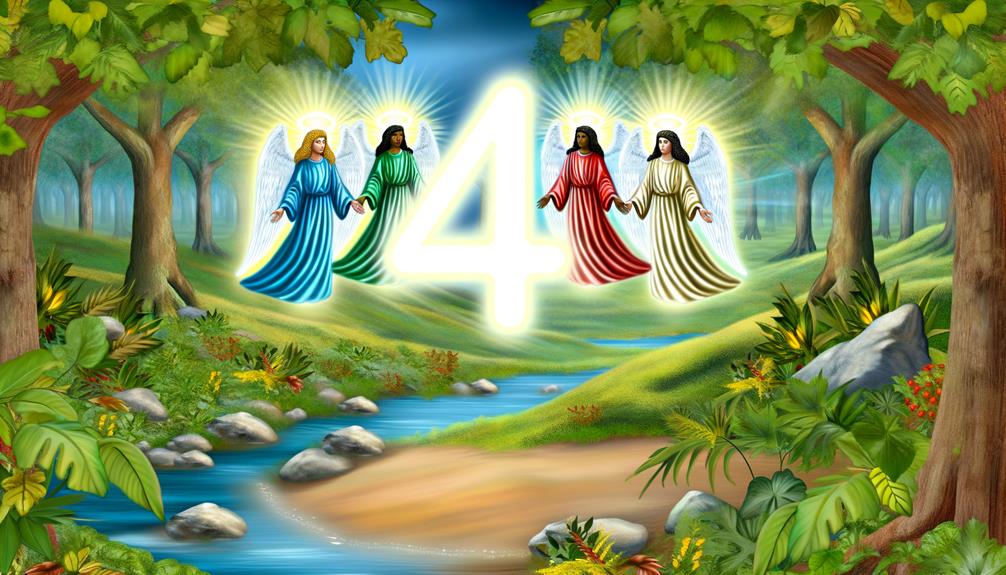541 Meaning in the Bible: Guidance and Transformation
In biblical numerology, 541 carries theological significance derived from its individual digits. The number 5 symbolizes divine grace, 4 denotes creation and completeness, and 1 represents unity and primacy, reflecting God’s oneness.
Together, they suggest the unification of divine grace within creation. While 541 does not appear explicitly in the Bible, its components enrich spiritual insights into the scriptural narrative.
Examining these numbers within their historical and theological contexts provides a deeper understanding of divine messages and spiritual truths embedded in biblical numerology, inviting further exploration into the intricacies of these symbolic representations.

541 Meaning in the Bible: Symbolism of Grace, Foundation, and Divine Leadership
| Aspect | Biblical Meaning |
|---|---|
| Grace & Favor | The number 5 symbolizes God’s grace, kindness, and favor, reflecting His blessings and divine mercy. |
| Foundation & Stability | The number 4 represents stability, foundation, and the strength of God’s creation and order. |
| Unity & Leadership | The number 1 signifies unity, leadership, and God’s supreme authority, emphasizing His oneness and sovereignty. |
| Divine Support & Direction | 541 suggests that with God’s grace and a strong foundation, one can lead a life of unity and purpose, guided by divine favor. |
| Spiritual Growth | This number calls for spiritual growth through relying on God’s grace, finding stability, and recognizing His divine leadership. |
Historical Context of 541

In examining the historical context of the number 541 in the Bible, it is essential to contemplate the numerological and cultural significance it held within ancient Hebrew and early Christian traditions.
Numerology was not merely symbolic but integrated into the fabric of societal norms and religious practices.
The Hebrew language, with its alphanumeric system known as Gematria, often assigned deeper meanings to numbers, embedding them in scriptural narratives.
While 541 does not overtly appear in biblical texts, its components—5, 4, and 1—may offer insight when analyzed through theological lenses.
Early Christians, inheriting these traditions, viewed numbers as divine communication tools.
The historical context therefore invites a profound exploration of how these communities interpreted divine messages embedded in numerals.
Symbolism of Numbers in the Bible

In exploring the Symbolism of Numbers in the Bible, it is essential to contemplate both the broader framework of biblical numerology and the specific interpretations attributed to the number 541.
Biblical numerology often assigns deep theological significance to numbers, reflecting divine order and spiritual truths.
Consequently, understanding the meaning of 541 within this context requires a thorough analysis of its scriptural occurrences and theological implications.
Biblical Numerology Significance
The intricate symbolism of numbers in the Bible reveals profound theological truths and reflects the divine structure of scriptural narratives.
Numbers such as three, seven, and twelve are recurrently used to convey completeness, divine perfection, and covenantal fullness. For instance, the number seven signifies perfection and is evident in the creation story and the seven seals in Revelation.
Similarly, the number twelve represents divine authority and governance, as illustrated by the twelve tribes of Israel and the twelve apostles.
Understanding these numerical symbols is essential for interpreting biblical texts, as they provide deeper insights into God’s nature and His relationship with humanity.
Such numerological significance underscores the Bible’s layered meanings, inviting readers into a more nuanced theological comprehension.
Interpretations of Number 541
Scholarly examination of the number 541 in biblical numerology reveals layers of symbolic meaning that can illuminate various theological dimensions within the scriptural context.
This number, while not explicitly cited in the Bible, can be dissected through its constituent digits: 5, 4, and 1. The number 5 often signifies grace and divine favor, 4 represents creation and the world, while 1 symbolizes unity and primacy.
When combined, 541 could be interpreted as the unity of divine grace manifesting in creation.
Additionally, in gematria—a traditional Jewish system of assigning numerical value to words—the sum of values in certain Hebrew phrases corresponding to 541 may provide deeper insights, linking this number to themes of divine providence and spiritual completeness.
541 in Old Testament

Understanding the significance of the number 541 in the Old Scriptures requires a thorough examination of its occurrences within the broader theological and historical contexts of Biblical text.
The number 541, while not overtly prominent, can be analyzed through its potential symbolic meanings and numerological implications. In the Judaic tradition, numbers often carry profound symbolic weight, reflecting divine order and spiritual truths.
The exploration of 541 may involve scrutinizing its appearances in genealogies, historical records, or prophetic literature. Each context might illuminate aspects of Israel’s covenantal relationship with God, revealing insights into divine providence and judgment.
Theological interpretations must consider the number’s alignment with Hebrew letters and words, potentially uncovering deeper layers of Biblical meaning and spiritual significance.
541 in New Testament

In the New Testament, the numerical symbolism of 541 invites a theological examination of its contextual and scriptural significance. One possible interpretation of the numerical symbolism of 541 is its connection to the biblical meaning of 666, often associated with the number of the beast in the book of Revelation. This could lead to a deeper exploration of themes such as evil, temptation, and spiritual warfare within the New Testament. Additionally, a theological examination of 541 may also involve a study of its relationship to other significant numbers in biblical numerology, such as 7, 12, and 40.
By analyzing instances where the number 541 appears or can be inferred, one can discern deeper layers of meaning within the text.
This exploration not only enhances our understanding of biblical numerology but also enriches our appreciation of the theological messages embedded in the New Covenant narrative.
Numerical Symbolism in 541
Analyzing the numerical symbolism of 541 in the New Covenant requires a deep examination of its theological implications and contextual significance within the scripture.
The number 541, although not immediately apparent in New Covenant texts, can be dissected through the lens of biblical numerology, which often reveals hidden layers of meaning.
Theological scholars might interpret 541 by examining its individual digits—5, 4, and 1—each carrying distinct symbolic connotations.
For instance, 5 often symbolizes grace, 4 represents creation or the world, and 1 denotes unity or primacy.
When synthesized, these numbers could suggest a theological narrative of divine grace permeating creation and leading to a unified spiritual truth.
This approach offers a nuanced understanding of scripture, enriching the biblical exegesis.
Scriptural References to 541
While the number 541 does not explicitly appear in New Covenant scripture, its components can be explored through a theological analysis of passages where the numbers 5, 4, and 1 hold significant meaning.
The number 5 often symbolizes grace, as seen in the five loaves feeding the multitude (Matthew 14:17-21).
The number 4 represents universality, as in the four corners of the earth (Revelation 7:1).
Finally, 1 signifies unity and primacy, reflecting God’s oneness (Ephesians 4:4-6).
Analyzing these numbers in a composite manner offers a layered understanding of divine grace, universal reach, and the unity of the Christian faith.
This approach enriches our scriptural engagement, revealing deeper theological insights within the New Covenant.
Spiritual Significance of 5
The number 5 in biblical scripture often symbolizes grace, divine favor, and God’s goodness towards humanity.
In theological context, the Pentateuch, comprising the first five books of the Bible, sets the foundation for God’s covenant and law, reflecting His grace in guiding His people.
Additionally, the five loaves of bread used by Jesus to feed five thousand (Matthew 14:17-21) illustrate divine favor and miraculous provision.
The Tabernacle’s structure also incorporates the number 5 extensively, signifying God’s presence and benevolence.
Moreover, the five-fold ministry outlined in Ephesians 4:11 underscores the divine plan for church leadership and spiritual growth.
Consequently, the number 5 recurrently epitomizes God’s grace and purpose manifest in biblical narratives and ecclesiastical practices.
Spiritual Significance of 4

The number four holds substantial theological significance within biblical texts, often symbolizing completeness and universality through references to the four elements—earth, air, fire, and water.
This quadripartite symbolism is echoed in the Bible’s numerous mentions of the four corners of the earth, underscoring a conception of the world in its entirety.
Symbolism of Four Elements
In biblical theology, the number four often symbolizes completeness and universality, particularly as it pertains to the four elements of earth, air, fire, and water.
These elements are seen as foundational components of creation, each representing a distinct aspect of God’s handiwork. Earth signifies stability and sustenance, air symbolizes life and breath, fire embodies purification and divine presence, while water signifies cleansing and renewal.
Together, they depict a holistic view of the natural world under God’s sovereign order. This theological framework underscores the harmony and interdependence of creation, reflecting divine wisdom and purpose.
Understanding these elements enhances our comprehension of biblical cosmology and the intricate ways God interacts with His creation.
Biblical Number Four
Building upon the symbolism of the four elements, the number four in biblical theology further encapsulates themes of completeness and divine order, reflecting its profound spiritual significance.
In Scripture, this number is frequently associated with the earthly domain and the material world, seen in the four cardinal directions—north, south, east, and west—representing the entirety of creation.
Additionally, the fourth day of creation, as narrated in Genesis, marks the establishment of celestial bodies, symbolizing governance over time and seasons.
The four living creatures in Ezekiel’s vision and the Book of Revelation underscore God’s omnipresence and sovereignty.
Consequently, the number four serves as a theological motif denoting universal order, stability, and the thorough nature of divine governance.
Spiritual Significance of 1

Recognized as a symbol of unity and primacy, the number 1 in biblical scripture often represents the singularity and sovereignty of God.
Theologically, this number underscores the monotheistic essence central to Judeo-Christian belief, epitomized in verses such as Deuteronomy 6:4: ‘Hear, O Israel: The Lord our God, the Lord is one.’
Contextually, it signifies God’s unparalleled authority and the indivisible nature of His being.
This single digit also conveys the idea of wholeness and completeness, reflecting God’s omnipotence and omnipresence.
In addition, the number 1 symbolizes the first in a series, denoting primacy and precedence, aligning with God’s position as the Alpha in Christian theology.
This foundational concept permeates biblical teachings, anchoring the faith’s core tenets.
Numerical Patterns in Scripture

Exploring beyond the singularity of 1, the Bible reveals a profound tapestry of numerical patterns that convey deeper theological and spiritual messages.
Numbers such as 3, 7, and 12 frequently appear, each carrying specific connotations. The number 3 often symbolizes divine completeness and the Trinity, while 7 signifies perfection or completeness, as seen in the creation week. The number 12 represents divine governance, evident in the twelve tribes of Israel and the twelve apostles.
These recurring numbers are not mere coincidences but are embedded within the scriptural narrative to illuminate divine truths and principles. Such patterns invite believers to investigate deeper into the text, fostering a richer understanding of God’s will and the unfolding of His divine plan.
Theological Interpretations of 541

Interpreting the number 541 within a biblical context requires an examination of its potential symbolic meanings and theological implications. To understand its significance, scholars often explore historical, linguistic, and numerical analyses, considering the broader scriptural narrative.
The number 541 could be investigated through:
- Gematria: Evaluating Hebrew letters’ numerical values to uncover deeper spiritual messages.
- Historical Context: Investigating how the number might relate to specific biblical events or periods.
- Scriptural References: Identifying occurrences and thematic connections within the Bible.
Such an analytical approach helps elucidate how 541 may reflect theological truths, contributing to a richer understanding of biblical numerology.
Modern Applications of 541

In contemporary theological studies, the number 541 is often examined for its potential relevance to modern spiritual practices and its alignment with current interpretative frameworks. Theological scholars explore how its numeric symbolism can be integrated into contemporary faith expressions, including prayer rituals and doctrinal teachings. The analysis of 541 also involves its application within various denominational contexts, fostering a deeper understanding of its spiritual significance.
| Aspect | Application |
|---|---|
| Numeric Symbolism | Integration into faith expressions |
| Prayer Rituals | Use in modern prayer practices |
| Doctrinal Teachings | Interpretation within denominational contexts |
| Spiritual Significance | Fostering deeper understanding |
This structured approach guarantees that the ancient significance of 541 continues to inspire contemporary believers, enhancing their spiritual journeys.
Conclusion
The exploration of the number 541 within the biblical narrative reveals a tapestry of historical and theological significance.
By examining its appearances in both the Old and New Scriptures, along with the symbolism attached to the numbers 5 and 1, one can discern deeper spiritual meanings.
How do these numerical patterns and theological interpretations shape contemporary understanding and application?
Ultimately, the study of 541 underscores the intricate and profound nature of biblical numerology.






